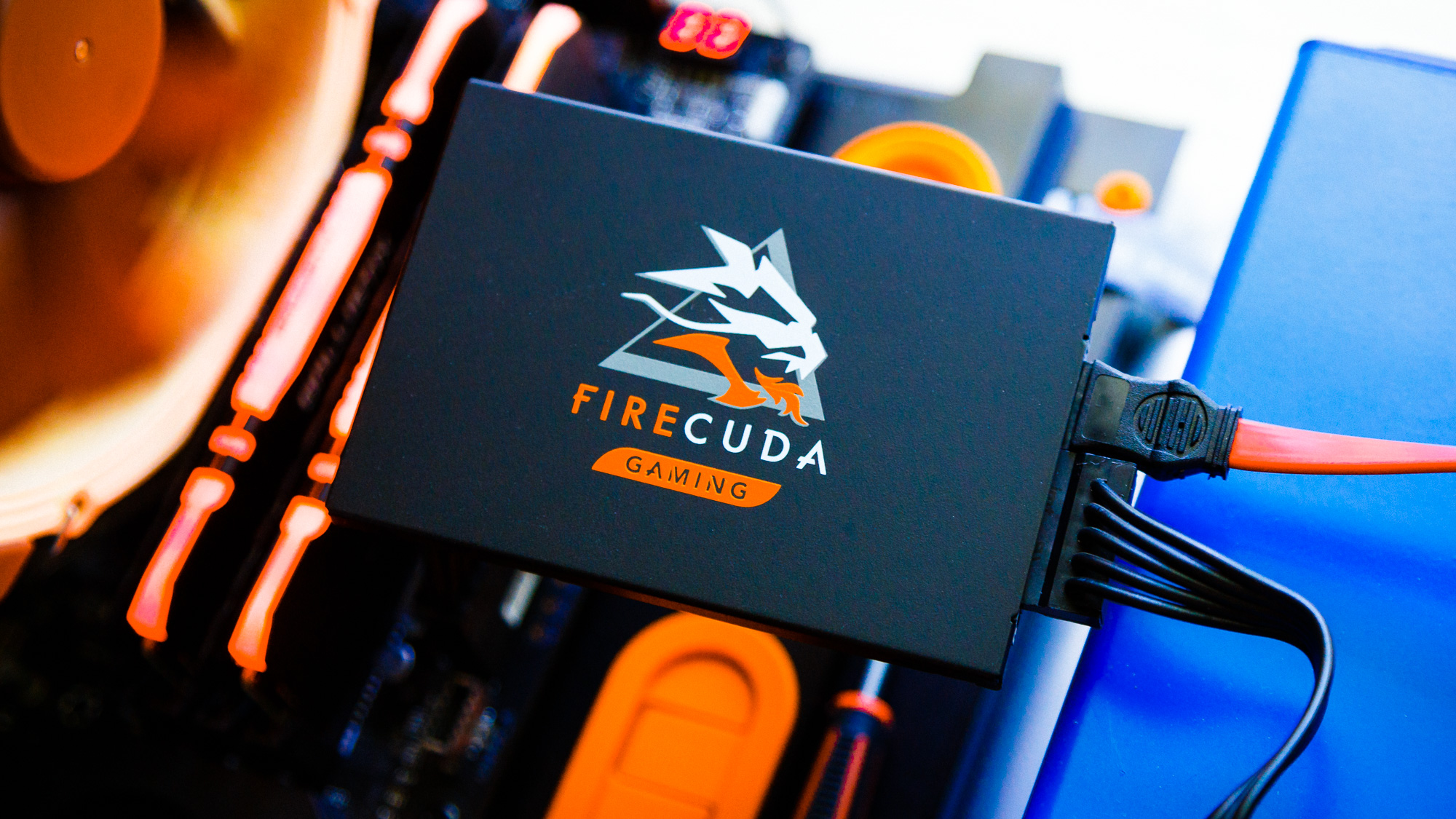Are you looking to replace your slow HDD storage with high-capacity flash? Seagate’s FireCuda 120 might be a good fit. The FireCuda SATA SSD is spacious, has a high endurance rating, and is designed specifically for gamers.
Seagate tapped Phison-designed hardware and BICS4 96-Layer TLC flash to create the 4TB FireCuda 120. Although Seagate built the SSD for gamers, it’s very high endurance ratings appeal to creative content editors and prosumers, too. As expected for a 4TB SSD, the price tag is a bit steep, but Seagate also charges more per gigabyte of storage than competing drives, so you pay for the extra endurance and three-year data recovery service that comes with the drive.
Specifications
| Product | FireCuda 120 500GB | FireCuda 120 1TB | FireCuda 120 2TB | FireCuda 120 4TB |
|---|---|---|---|---|
| Pricing | $99.99 | $189.99 | $299.99 | $619.99 |
| Capacity (User / Raw) | 500GB / 512GB | 1000GB / 1024GB | 2000GB / 2048GB | 4000GB / 4096GB |
| Form Factor | 2.5″ 7mm | 2.5″ 7mm | 2.5″ 7mm | 2.5″ 7mm |
| Interface / Protocol | SATA 6 Gbps / AHCI | SATA 6 Gbps / AHCI | SATA 6 Gbps / AHCI | SATA 6 Gbps / AHCI |
| Controller | PS3112-S12 | PS3112-S12 | PS3112-S12 | PS3112-S12 |
| DRAM | DDR3L | DDR3L | DDR3L | DDR3L |
| Memory | Kioxia 96L TLC | Kioxia 96L TLC | Kioxia 96L TLC | Kioxia 96L TLC |
| Sequential Read | 560 MBps | 560 MBps | 560 MBps | 560 MBps |
| Sequential Write | 540 MBps | 540 MBps | 540 MBps | 540 MBps |
| Random Read | 100,000 IOPS | 100,000 IOPS | 100,000 IOPS | 100,000 IOPS |
| Random Write | 90,000 IOPS | 90,000 IOPS | 90,000 IOPS | 90,000 IOPS |
| Security | N/A | N/A | N/A | N/A |
| Endurance (TBW) | 700 TB | 1,400 TB | 2,800 TB | 5,600 TB |
| Part Number | ZA500GM10001 | ZA1000GM10001 | ZA2000GM10001 | ZA4000GM10001 |
| Warranty | 5-Years | 5-Years | 5-Years | 5-Years |
Seagate’s FireCuda 120 is available in capacities of 500GB 1TB, 2TB, and 4TB. Seagate rates the SATA 6 Gbps SSD for sequential read/write throughput of up to 560/540 MBps, and it can sustain up to 100,000/90,000 random read/write IOPS.
You’ll pay a premium for the drive – high street prices of $0.15-$0.20 per gigabyte are up to twice the price you’ll pay for competing SSDs. The high price partially stems from the FireCuda’s high endurance ratings, but the three years of Rescue Data Recovery Services probably plays a role, too.
Along with its high capacities, Seagate’s FireCuda 120 comes with endurance ratings that stretch up to 5.6 petabytes, which translates to 0.7 Drive Writes per Day (DWPD) within its five-year warranty. This is partly due to Phison’s third-gen 340 bit/2KB LDPC ECC and other mechanisms, like static and dynamic wear-leveling, RAID ECC, and overprovisioning.
Software and Accessories
Seagate supports the SSD with SeaTools SSD, an SSD toolbox that allows users to monitor the SSD. The drive also comes with Seagate DiscWizard, a simple-to-use system cloning and backup software.
Image 1 of 3
Image 2 of 3
Image 3 of 3
A Closer Look
Image 1 of 4
Image 2 of 4
Image 3 of 4
Image 4 of 4
The FireCuda 120’s black metal casing gives it a quality feel, and the design is appealing if you plan on showing off the SSD in your computer case. The SSD comes in a slim 2.5” 7mm form factor, so it will also fit in most laptops that accept the form factor.
The Phison PS3112-S12 SATA 6 Gbps SSD controller, a robust 8-channel controller manufactured on TSMC’s 28nm process technology, powers the drive. It leverages a dual-CPU architecture with a built-in 32-bit microcontroller. The controller clocks in at 666 MHz and interfaces with two of Kingston’s 8Gb DDR3L 1,600 MHz DRAM ICs to cache metadata and ensure responsive performance.
The controller supports secure erase, end-to-end data path protection, Trim, SMART data reporting, and thermal throttling that’s managed via an internal thermal sensor. It also comes with Phison’s SmartFlush algorithm that prevents data loss by flushing the DRAM to the cache when the drive is idle. SmartRefresh also helps to ensure data integrity by scanning for NAND errors when an idle state is detected.
The FireCuda also supports DevSleep for low power draw when idle. However, unlike competing drives like Crucial’s MX500 and Samsung’s 860 EVO, the SSD lacks AES 256-bit disk encryption to keep your data secure.
Our sample has a massive amount of Kioxia’s BiCS4 96L TLC flash that interfaces with the controller. Seagate uses eight packages in total, with each package containing eight 512GB dual-plane dies. The FireCuda 120’s BiCS4 flash operates at 533 MTps, which isn’t nearly as fast as some of the newest NAND. However, the controller has more than enough speed and interleaving to pump out SATA-bus-saturating performance at every capacity point.
MORE: Best SSDs
MORE: How We Test HDDs And SSDs
MORE: All SSD Content
